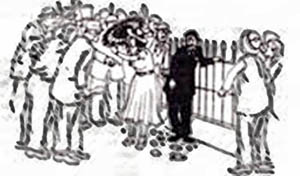

Braving injustice in South Africa |
Assault on Gandhi"During his stay in India, Gandhiji had been trying to tell people of the hardships which the Indians in South Africa suffer at the hands of the white people. The white men therefore strongly disliked Gandhiji's activities. And the South African newspapers gave a very wrong and misleading account of what he was trying to do. So the whites became indignant with him. If they could have had their way, they would have done away with him. But the hand of God was with Gandhiji, and he was not afraid. He had hardly come down from the ship, when he was surrounded by a group of European boys and ruffians. They threw stones and rotten eggs at him and kicked him and handled him roughly. Poor Gandhiji could hardly do anything to defend himself. Luckily the wife of one of his European friends was passing that way. She ran through the crowd and came and stood in front of him. Seeing a white woman protect him, the crowd of hooligans gradually melted away, and she took him to the house of his friend Rustomji. In the evening, however, Rustomji's house was surrounded by a white mob, who shouted and yelled and threatened to hang Gandhiji on the sour apple tree. The crowd looked mad and murderous and Gandhiji's life was in real danger. It was with the greatest difficulty that his friends managed to rescue him and take him to a place of safety.  Gandhiji could have easily got those hooligans punished. But he had not forgotten the lesson of love and forgiveness which his father had taught him. He showed no desire to avenge himself on the white people. This had a great effect on the whites. Their hatred for the Indians became less fierce. When the Boer War broke out in South Africa, Gandhiji helped the English against the Boers. Any one else would have used this excellent opportunity to have his revenge upon the English people. But Gandhiji always believed in returning good for evil, and in winning over the enemy with love and kindness. He stuck to his noble ideal. He made Englishmen believe in his own goodness and sincerity as well as in the goodness and sincerity of the other Indians living in South Africa. God had blessed Gandhiji with everything that man could desire-wife and children and money. But he was not happy and his mind was not at peace. As with Gautama the Buddha, comfort and luxury made him uneasy, and he felt that the way to find peace lay in giving up worldly comfort and luxury, and living a life of simplicity. And so he decided to do everything himself: he washed his own clothes, swept his rooms himself, cooked his food and even cleaned his lavatory himself. Barber denies service One day Gandhiji needed a hair-cut, and he went to a white barber's shop. I have told you already how the white people hated the Indians. The white barber refused to serve Gandhiji. And what do you think Gandhiji did? He quietly returned home and sat down to cut his own hair. He had never practiced hair-cutting before and you can imagine, the hair was cropped very unevenly and clumsily, as though a mouse had been nibbling at it while he was asleep. His friends laughed at him when he went to the court the next day. But when he told them how he had been driven to do the job himself, they were all stunned. And since that day, he never kept the hair-style of the west and always cut his hair himself." "I am sure, mother, that day when Gandhiji saw himself in the mirror, he must have had a good laugh at himself." "Yes, of course. He always enjoyed a joke, even at his own expense. But, to go on with our story, when the Boer war ended in 1902, Gandhiji longed to return home and serve his people there. At last he decided to pack up and sail for India. The Indians in South Africa showed their gratitude by giving him a number of valuable presents. To his wife Kasturbai they presented a lovely diamond necklace. But Gandhiji handed over everything to the local Congress office, so that these could be used in the service of the people. He believed that a servant of the people had no right to accept presents and keep them for his personal use. Returns to IndiaGandhiji returned to India in 1906. Preparations for the Calcutta session of the Indian National Congress were then in full swing. Every Indian's heart was set on winning freedom. But they lacked unity and organization. They had little discipline or sense of duty. They had not learnt that the smaller things of life were as important as the bigger ones, and they did not understand that there was dignity in all labour. At this time, Gandhiji offered his services to the Congress. He took upon himself the job of cleaning up the visitors' rooms every day. It was at this session of the Congress that he told the Indian leaders all about the conditions of the Indians in South Africa, and made them keenly interested in their cause. After the Congress session he returned to his home in Rajkot, visiting Banaras, Agra, Jaipur and Palanpur on the way. He travelled third class all along, and his total expenses throughout the journey came to only thirty-one rupees! And he travelled very light. His entire luggage consisted of a small tin box for carrying food, and a bag in which he kept a warm coat, a dhoti, a shirt and a towel. And these simple habits remained with him ever after. Till the last day of his life, he travelled third class." "But, mother, didn't Gandhiji carry a soap and a tooth-brush in his bag ?" "No, my child. He used a natural tooth-brush, what we call a dantan in Hindustani." 21. A thin green branch of tree used for scrubbing teeth |